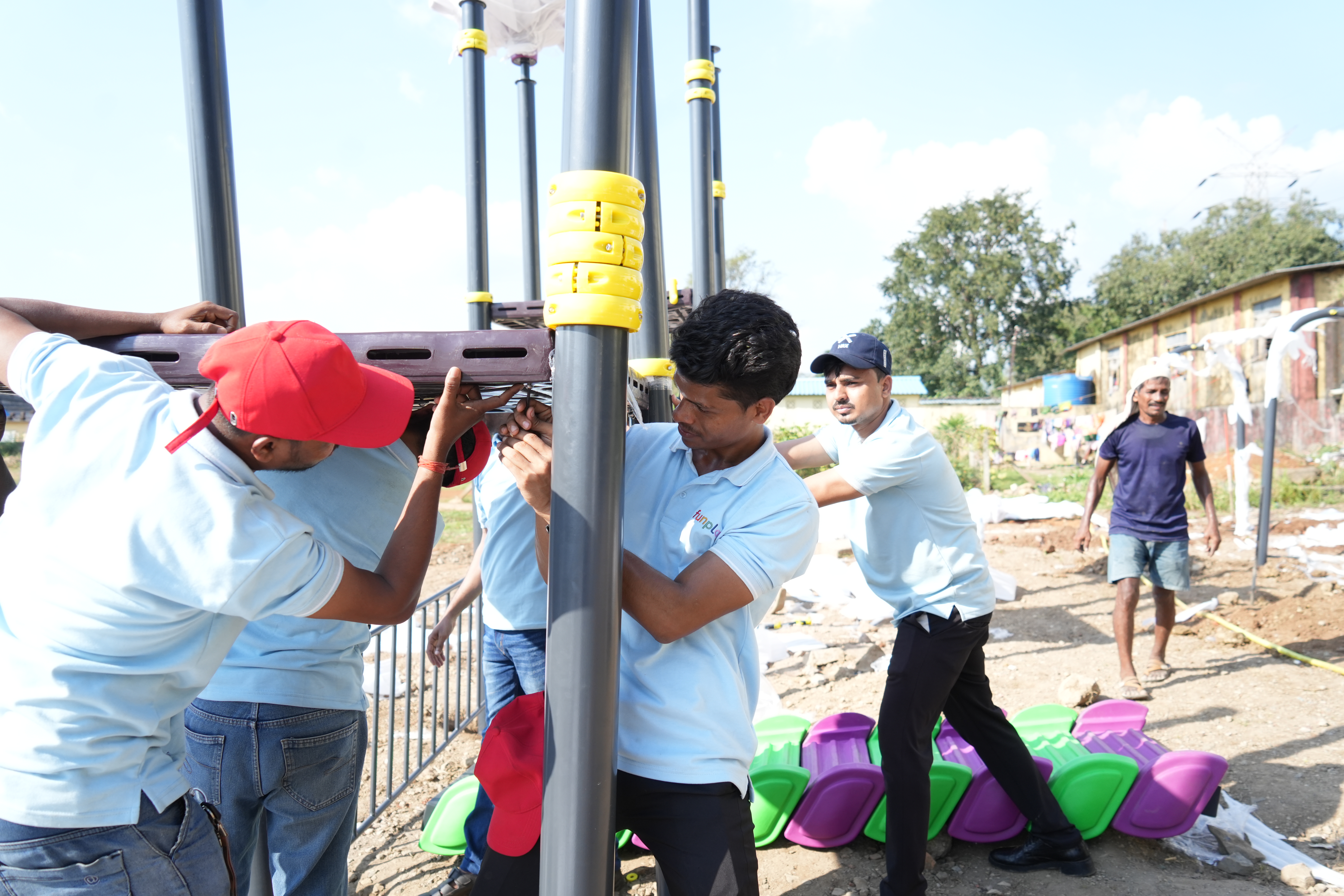Why Playtime Is Just as Important as Academics
Playtime in India is often overlooked, but research shows it
is just as vital as academics for a child’s development. In this blog, we’ll
break the myth and show why
outdoor play, physical activity, and creative play
are essential for every child’s growth, learning, and happiness.
FunPlay Systems is committed to building a future where every child
in India has access to safe, innovative, and inspiring play spaces. For more
on our mission, visit our
About Us page.
Benefits of Playtime for Children
-
Boosts Academic Performance: Regular play improves focus,
memory, and problem-solving skills, helping children excel in school.
-
Promotes Physical Health: Outdoor play and playground
activities build strong bodies and healthy habits. See our
outdoor playground equipment for schools and
parks. Popular products include the
Toucan
(nature-inspired climber),
Bellatrix
(modular play system), and
Ulta Ghar
(imaginative upside-down house).
-
Encourages Social Skills: Playing with others teaches
teamwork, communication, and empathy. Read more in our
Why India Needs More Playgrounds
blog.
-
Reduces Stress: Playtime helps children relax, recharge,
and return to studies with renewed energy.
-
Fosters Creativity: Imaginative play sparks innovation and
creative thinking.

Learn more about
outdoor playground equipment and how
it supports holistic development. Explore
Toucan,
Bellatrix, and
Ulta Ghar
for unique play experiences.
Playtime is Not Just Fun – It’s Learning!
When children play, they are not just having fun; they are learning important skills that help them grow.
Playtime teaches children essential abilities through engaging
playground equipment and activities.
Key Skills Children Develop Through Play
-
Creativity: Pretend play, drawing, and building encourage imagination.
Explore our Phula and
FunPlay Originals for imaginative play.
-
Problem-Solving: Games and activities help kids think critically.
Discover advanced solutions in our Nexlev Series.
-
Social Skills: Group play teaches sharing, teamwork, and communication.
Read more in our
commercial playground equipment guide
.
-
Motor Skills: Running, jumping, and climbing build strength and coordination.
Check out our CoreCraft fitness equipment for muscle development.
The Connection Between Play and Brain Development
Research shows that playtime is crucial for brain development.
It strengthens focus, learning ability, and memory retention, laying a foundation for lifelong growth.
- Active Play: Running, jumping, and sports improve focus and concentration.
- Creative Play: Drawing and building blocks boost imagination and innovation.
- Social Play: Group play develops communication, empathy, and teamwork.
Why Play is Important for Academic Success
It’s not a choice between academics or play — both go hand in hand. Play enhances academic outcomes by:
- Stress Relief: Reducing stress helps children focus better in class.
- Memory Boost: Repetition through play strengthens memory and recall.
- Better Concentration: Regular play improves attention spans in school.
Why is Playtime Overlooked in India?
- Focus on Marks: Exam-oriented systems reduce play opportunities.
- Lack of Space: Urban areas often lack safe outdoor play zones.
- Cultural Beliefs: Many still prioritize study time over play, undervaluing its benefits.
How Can We Change This?
- Balanced Schedules: Parents and schools should combine study with daily playtime.
- Playgrounds in Schools: Safe, well-designed playgrounds must be standard in education.
Learn more in our
supplier guide
.
- Awareness: Educating parents and teachers on the importance of play ensures better support.
- Encourage Outdoor Play: Sports, cycling, and running should replace excessive screen time.
See our
apartment play equipment guide
.
Customer Testimonial
“After installing FunPlay’s playground equipment, our students are more active, creative,
and focused in class. Playtime has truly made a difference!”
Conclusion: The Essential Role of Play in Education
FAQs
How can schools balance academics and playtime?
Schools can create balanced schedules that include regular play breaks, integrate movement into lessons, and educate parents about the value of play for learning and well-being.
What are some creative ways to encourage play at home?
Parents can set up play invitations, rotate toys, organize outdoor games, and join in imaginative play to make learning fun and interactive.
Is playtime important for teenagers and older children?
Yes, playtime remains important for all ages. Older children benefit from sports, creative projects, and social games that support emotional health and teamwork.
In the rush to focus on academics, we often forget that children’s
emotional, social, and physical development is just as important.
Playtime is not a luxury—it’s a necessity for growing up healthy,
happy, and successful.
So let’s break the myth that play is just a distraction from
schoolwork. Play is an essential part of education. It builds
strong brains, healthy bodies, and well-rounded individuals.
Ready to bring the power of play to your school or community?
Contact FunPlay Systems for a
free consultation and discover our range of
outdoor playground equipment
designed for Indian schools, parks, and societies. For more
inspiration, check our
project gallery and
blog.
